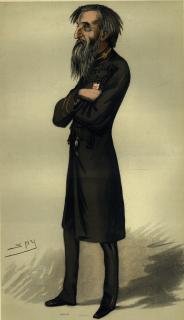|
|
|
| 'GENERAL' WILLIAM BOOTH [1829-1912] FOUNDER OF THE SALVATION ARMY |
| William Booth was born in Nottingham in 1829. At the age of 13 he was sent to work as an apprentice in a pawnbroker's shop to help support his mother and sisters. He did not enjoy his work because it made him only too aware of the poverty in which people lived and how they suffered degradation and humiliation because of it. During his teenage years he became a Christian and spent much of his spare time trying to persuade other people to become Christians too. When his apprenticeship was completed he moved to London, again to work in the pawnbroking trade. He joined up with the local Methodist Church and later decided to become a minister. After his marriage to Catherine Mumford in 1855 he spent several years |
 |
 |
| William Booth in old age |
| Booth caricatured in 1882 |
| as a Methodist minister, travelling all around the country, preaching and sharing God's word with all who would listen. However, he felt that God wanted still more from him, and that he should be doing more to reach the ordinary people. He returned to London with his family, having resigned his position as a Methodist minister. One day in 1865 he found himself in the East End of London, preaching to crowds of people in the streets. Outside the Blind Beggar pub in Whitechapel, some missioners heard him speaking and they were so impressed by his powerful preaching that they asked him to lead a series of religious meetings they were holding in a tent . The tent was situated on an old Quaker burial ground on Mile End waste in Whitechapel. The date for the first meeting was set for July 2nd 1865. To the poor and wretched of London's East End, Booth brought the good news of Jesus Christ and His love for all mankind. Booth soon realised that he had found his destiny. He formed his own movement called 'The Christian Mission'. Slowly the Mission began to grow but the work was hard and Booth would "stumble home night after night haggard with fatigue, often his clothes were torn and bloody |
| bandages swathed his head where a stone had struck", wrote his wife. Evening meetings were held in an old warehouse where urchins threw stones and fireworks through the window. Outposts were eventually established and in time attracted converts, yet the results were discouraging- this was just another of the 500 charitable and religious groups trying to help the poor and needy in London's East End. |
 |
| Name change from 'The Christian Mission' to ' The Salvation Army'. Printer's proofs from 1865 |
| It was not until 1878, when 'The Christian Mission' changed its name to 'The Salvation Army' that things began to happen. The idea of an army fighting sin caught the imagination of the people and the Army began to grow rapidly. Booth's fiery sermons and sharp imagery drove the message home and more and more people found themselves willing to leave their past behind and start a new life as a soldier in the Salvation Army. In 1890 General Booth published his book ' In Darkest England and the Way Out' in which he set out his blueprint for the future of mankind. The military spirit of the movement meant that The Salvation Army soon spread abroad. By the time Booth died [or was "promoted to Glory"] in 1912, the Army was at work in 58 countries. |
| The work of the Salvation Army |
| "While women weep as they do now! I'll fight; while little children go hungry as they do now, I'll fight; while men go to prison, in and out, in and out, as they do now, I'll fight- I'll fight to the very end!" William Booth |